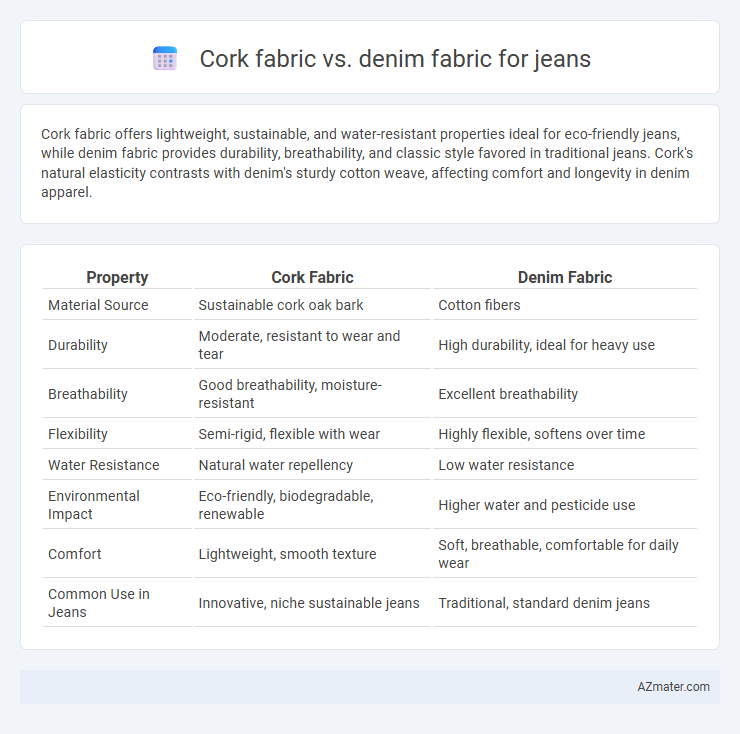Cork fabric offers lightweight, sustainable, and water-resistant properties ideal for eco-friendly jeans, while denim fabric provides durability, breathability, and classic style favored in traditional jeans. Cork's natural elasticity contrasts with denim's sturdy cotton weave, affecting comfort and longevity in denim apparel.
Table of Comparison
| Property | Cork Fabric | Denim Fabric |
|---|---|---|
| Material Source | Sustainable cork oak bark | Cotton fibers |
| Durability | Moderate, resistant to wear and tear | High durability, ideal for heavy use |
| Breathability | Good breathability, moisture-resistant | Excellent breathability |
| Flexibility | Semi-rigid, flexible with wear | Highly flexible, softens over time |
| Water Resistance | Natural water repellency | Low water resistance |
| Environmental Impact | Eco-friendly, biodegradable, renewable | Higher water and pesticide use |
| Comfort | Lightweight, smooth texture | Soft, breathable, comfortable for daily wear |
| Common Use in Jeans | Innovative, niche sustainable jeans | Traditional, standard denim jeans |
Introduction to Cork Fabric and Denim Fabric
Cork fabric, derived from the bark of cork oak trees, offers a lightweight, sustainable alternative to traditional textiles with natural water resistance and durability. Denim fabric, composed primarily of cotton twill, is renowned for its ruggedness, breathability, and timeless appeal in jeans manufacturing. Both materials present distinct textures and environmental impacts, influencing their suitability and performance in denim apparel.
Origin and Production Processes
Cork fabric originates from the bark of the cork oak tree, predominantly harvested in Mediterranean regions such as Portugal and Spain, where the bark is carefully stripped without damaging the tree to ensure sustainable production. Denim fabric, invented in the 19th century in Nimes, France, is traditionally woven from cotton twill, utilizing indigo dyeing techniques that create its characteristic blue color and robust texture. The production process of cork fabric involves flattening and bonding the natural cork sheets to textile backings, while denim undergoes spinning, weaving, dyeing, and finishing to achieve durability and comfort for jeans.
Environmental Impact and Sustainability
Cork fabric offers a significantly lower environmental impact than denim, as it is harvested from the bark of cork oak trees without harming the tree, promoting sustainable forestry and carbon sequestration. Denim production involves intensive water use, chemical treatments, and cotton cultivation, which often requires large amounts of pesticides and synthetic fertilizers, contributing to soil degradation and water pollution. Choosing cork fabric for jeans supports renewable materials and reduces the carbon footprint compared to conventionally produced denim.
Durability and Longevity Comparison
Cork fabric offers excellent durability due to its natural resistance to wear, moisture, and abrasion, making it a sustainable alternative for long-lasting jeans. Denim fabric, traditionally made from tightly woven cotton, provides exceptional strength and resistance to tearing, often improving with age through fading and softening. When comparing longevity, denim's proven ability to endure repeated washing and heavy use makes it a benchmark, while cork fabric's unique resilience and eco-friendly properties position it as an innovative option for durable, long-lasting jeans.
Comfort and Wearability
Cork fabric offers exceptional breathability and lightweight comfort, making it an excellent choice for jeans that require flexibility and softness throughout the day. Denim fabric, known for its durability and rugged texture, provides superior wearability and long-lasting resistance but can feel stiff initially. When prioritizing comfort, cork fabric adapts more easily to body movements, while denim excels in enduring heavy use and maintaining shape over time.
Aesthetic Appeal and Style Options
Cork fabric offers a unique, natural texture with a distinctive matte finish that enhances jeans with an eco-friendly and contemporary aesthetic, appealing to fashion-forward consumers. Denim fabric, renowned for its classic indigo hues and versatile washes, provides a timeless, rugged look that supports a wide range of styles from casual to high fashion. While cork fabric is niche and innovative, denim remains the dominant choice for traditional and diverse jean designs.
Care and Maintenance Requirements
Cork fabric for jeans requires gentle cleaning with a damp cloth and mild soap to maintain its natural texture and prevent cracking, avoiding machine washing or harsh chemicals. Denim fabric demands regular washing to remove dirt and oils, preferably inside out and in cold water to preserve color and prevent shrinkage, with occasional drying at low heat or air drying to maintain fabric integrity. Both materials benefit from spot cleaning, but cork's biodegradable nature makes it more sensitive to moisture, while denim's durability allows for more rigorous care routines.
Price and Market Availability
Cork fabric is less common and considerably more expensive than denim, with prices often two to three times higher due to its sustainable, natural origin and limited production scale. Denim fabric dominates the jeans market because of its widespread availability, affordability, and established manufacturing infrastructure, making it the preferred choice for mass-market apparel. The scarcity of cork fabric in mainstream fashion limits its accessibility, while denim's extensive global supply chain ensures consistent pricing and availability.
Consumer Preferences and Trends
Cork fabric is gaining popularity for jeans due to its sustainable, vegan-friendly properties and lightweight comfort, appealing to eco-conscious consumers seeking alternative materials. Denim fabric remains the dominant choice, valued for its durability, classic style, and versatility, consistently favored in mainstream fashion trends. Recent market data shows a growing niche segment for cork jeans driven by ethical fashion awareness, while denim maintains strong demand supported by traditional preferences and seasonal innovations.
Which Fabric is Best for Jeans?
Denim fabric is traditionally preferred for jeans due to its durability, classic texture, and ease of dyeing, offering long-lasting wear and a versatile style. Cork fabric, made from sustainable cork oak bark, provides a lightweight, waterproof, and eco-friendly alternative but lacks the same strength and flexibility required for everyday jeans. For long-term use and timeless appeal, denim remains the best fabric choice for jeans, while cork fabric suits niche markets focused on sustainability and unique aesthetics.

Infographic: Cork fabric vs Denim fabric for Jeans
 azmater.com
azmater.com